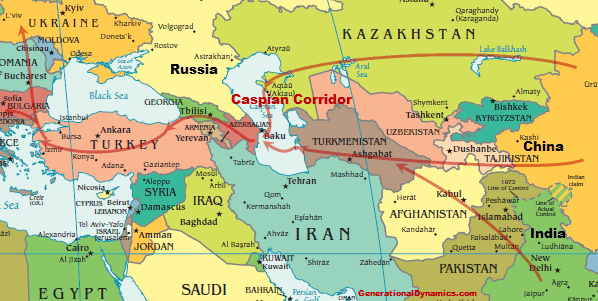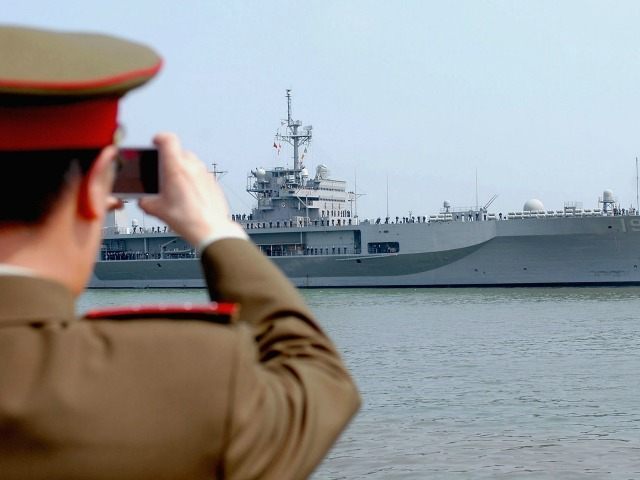This morning’s key headlines from GenerationalDynamics.com
- More on China’s New Silk Road through the ‘Caspian Trade Corridor’
- China and Cambodia hold military exercises amid South China Sea tensions
More on China’s New Silk Road through the ‘Caspian Trade Corridor’

The Caspian Trade Corridor is part of the New Silk Road connecting Asia with Europe
Georgia’s Prime Minister Giorgi Kvirikashvili has concluded negotiations to award a construction firm the contract to build a deep water port in the town of Anaklia, a beach resort on the Black Sea.
The Anaklia deep water port is thought to be an important piece of China’s “New Silk Road” for transit of commercial goods between Europe and China. Several weeks ago we described in detail the “Caspian Trade Corridor,” illustrated in the map shown above. ( “21-Jan-16 World View — Azerbaijan forced to choose between Russia and Turkey”)
The route from China to Europe was tested in December. A train from eastern China traveled first through Kazakhstan. Then the cargo traversed the “Caspian Corridor” when the containers were put on ships and taken across the Caspian Sea to Baku, Azerbaijan. In Baku, the cargo was put back on a train, which traveled on to Europe via Azerbaijan, Georgia and Turkey. Despite what looks like a complicated route, this ground transportation alternative is much shorter than the sea route that it replaces.
However, the awarding of the contract for the Anaklia port contained a big surprise. Early last year, seven companies submitted proposals to design and build the port, and in June Georgia’s government selected two candidates as “preferred applicants.” It was expected that Power China, backed by the Chinese government, would win the contract.
The surprise was that the contract was awarded to the other applicant, the Anaklia Development Consortium, backed by funding from Georgian bank TBC. A key figure in the winning consortium appears to be Timur Korchava, a Russian billionaire of Georgian descent. Furthermore, it appears that Korchava was backed by Russian government support.
It is thought that the Russian government has two major objectives in supporting this project. First, Russia would like to force China, as much as possible, to continue transporting goods through Kazakhstan and then through Russia. And second, Russia will use the port to deliver goods to Armenia, where a Russian military base is stationed.
Whatever Russia’s motives, it appears that the Russians have snatched victory from the Chinese. Jamestown and Georgia Online (13-Dec-2015-Trans) and Ros Business Consulting (Russia, 13-Dec-2015)
China and Cambodia hold military exercises amid South China Sea tensions
China and Cambodia conducted joint naval exercises for the first time on Friday. Three Chinese navy warships with 737 Chinese sailors took part, along with about 70 Cambodian sailors. Last week, both Chinese and Cambodian officials said that there would be military exchanges, friendly football matches, as well as a joint drill. According to Cambodia’s deputy navy chief Vice Admiral Vann Bunneang, “This will be a big cooperation and joint exercise training in rescue operations. This is to boost readiness for when boats sink and natural disasters occur.” Very jolly.
China is the largest donor of military aid to Cambodia, including jeeps, shoulder-fired rockets and helicopters, and help in running a Cambodian defense academy.
Although Cambodian officials bristle at suggestions that they are doing China’s bidding, Cambodia has been the region’s most reliable ally in disputes involving Taiwan and the South China Sea. Unlike many other southeast Asian countries, where students usually wish to learn English as a foreign language, Cambodian students are learning Mandarin Chinese. At a 2012 meeting of the 10-member Association of Southeast Asian Nations (ASEAN), Cambodia vetoed attempts to even discuss the South China Sea issues.
Admiral Tea Vinh, commander of the Royal Cambodian Navy, revealed that Cambodia was in negotiations to buy two 140-metre heavy warships armed with modern weapon systems from China. “The Royal Cambodian Navy needs two warships but communication is in process between the two defence ministries. We will not use them for war – we will only use them to protect our territorial sovereignty. Cambodia should not be looked down on by its neighbors.” This is the sort of thing that China always says, although it’s not clear to me how Cambodia will “protect [their] territorial sovereignty” without ever going to war.
The ranking Chinese navy officer, Rear Admiral Yu Manjiang, said said that China’s visit to Cambodia showed their warm ties and was “like visiting a sibling’s home.” That reminds me of a 2011 remark by Pakistan’s ambassador to China Masood Khan who said that Pakistan’s relationship with China was “higher than mountains, deeper than oceans, stronger than steel, sweeter than honey, and dearer than eyesight.”
Here in these Generational Dynamics World View articles, we try on a regular basis to discern who will be who’s ally in the approaching Clash of Civilizations world war. These days, it seems pretty clear that Japan, Philippines, Vietnam and India will be allied with the United States and Russia, while Pakistan and Cambodia will be allied with China. Phnom Penh Post and Radio Free Asia and The Diplomat and Reuters
KEYS: Generational Dynamics, Georgia, Anaklia, Giorgi Kvirikashvili, China, New Silk Road, Caspian Trade Corridor, Caspian Sea, Kazakhstan, Azerbaijan, Turkey, Power China, Anaklia Development Consortium, Timur Korchava, Cambodia, Association of Southeast Asian Nations, ASEAN, Tea Vinh, Royal Cambodian Navy, Yu Manjiang, Pakistan, Masood Khan
Permanent web link to this article
Receive daily World View columns by e-mail

COMMENTS
Please let us know if you're having issues with commenting.